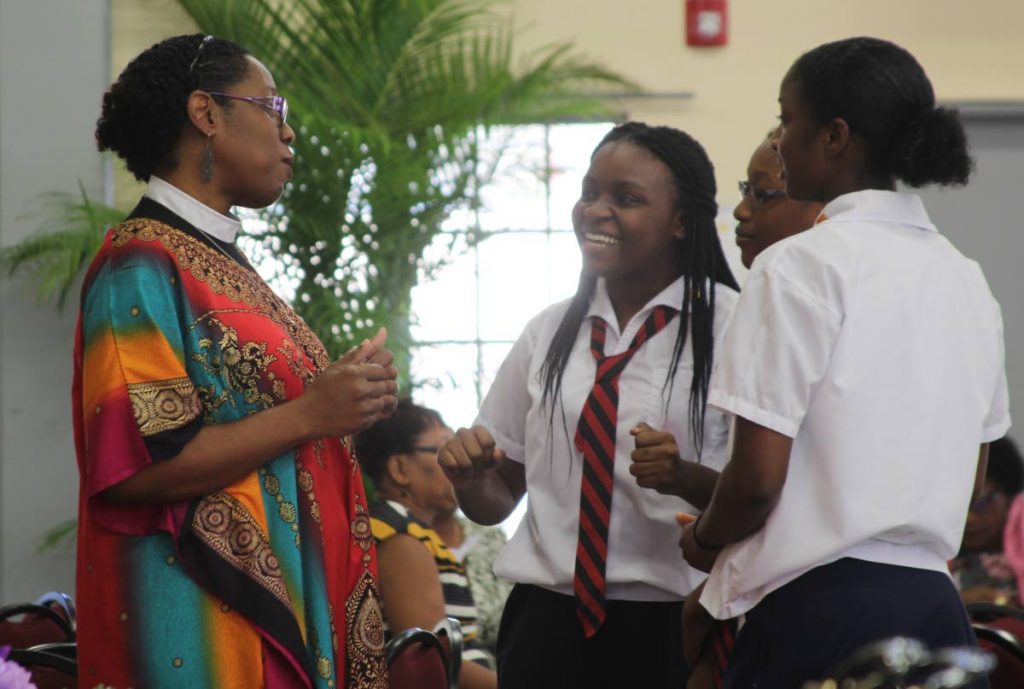‘Catcalls unacceptable’

Rhianna Mc Kenzie
President Paula-Mae Weekes is calling on men to take the lead in addressing issues of violence against women. “How we act in the church has to follow us home,” the President said as she delivered the feature address at a prayer breakfast at the St Mary’s Anglican Parish Hall, Tacarigua, yesterday, in commemoration of the United Nation’s International Day of Elimination of Violence Against Women and Girls.
“That’s where our activism begins,” she said of the importance of the church in creating awareness. She said certain acts, such as catcalling, to which women are subjected to on a daily basis, are “completely unacceptable” and that “violence against women and girls affects us all”, including men.
The President highlighted the names of young women who had been murdered in recent weeks, among them Sade Emmanuel, Yvonne Trumpet-Nicholson, Amy Leslie James and Haseena Ali. “I named each victim because if not, they become invisible, remote, other people from whom we can easily dissociate ourselves. But these women represent us.” She criticised social media for “highlighting the national appetite for gore and sensationalism (and) diminishing the dignity of the victims,” and called for the removal of society’s “rose tinted spectacles” when it comes to these issues. She said while gatherings like the one hosted by the church are needed and a great place to start, it is “simply stalling”.
“We must step in and step out,” because while awareness is “a necessary first step, it is not the complete solution”.
The breakfast was hosted by the leaders of the Anglican Church in an effort to educate and acknowledge the growing issue of domestic violence in the country as part of the church’s #HearMeToo campaign, aimed at ending violence against women and girls. The event included praise and worship, prayers for the nation and remarks from church leaders.
Domestic violence survivor and mother of seven Camika McLetchie gave a riveting testimony in which she highlighted the predispositions that lead to abuse and the difficulties in leaving an abusive situation, especially when children are involved. “I hear it all the time in Trinidad and Tobago. They ask ‘why do you take that?’ It’s a conditioning. Over time you are conditioned to accept abuse, especially if you have issues before in your childhood.” McLatchie warned that domestic violence is not just physical abuse. “There are seven different types of domestic violence. They are physical, sexual, verbal, psychological, medical, spiritual and financial.” She also addressed the argument often posited to her that “God does not agree with divorce”, an argument with which she said she agrees, but which she went against for the sake of her children. “God does not agree with domestic violence either,” McLatchie said. She now counsels survivors through her non-profit organisation, RISE, which provides services for both victims and for perpetrators, who also need help. “We need to understand and change our perspective.”
Antoinette Jack-Martin of the Office of the Prime Minister, Gender and Child Affairs gave global estimates provided by the World Health Organisation, which indicate that one in three women worldwide are subject to either physical or sexual intimate partner violence or non-partner violence in their lifetime.
Locally, she said, the statistics are just as disturbing. Data from the TT Police Service indicate that from January to October there have been 845 incidents reported, 665 of whom are women and 180 men. There were also 650 reported cases of sexual assault, with the accused being a family member, intimate partner or close relative.
“Ladies and gentlemen, these figures are alarming,” Jack-Martin said. She emphasised the significance of the 16 days of Activism, which is commemorated annually from November 25 to December 10. The international campaign is aimed at ending gender-based violence, particularly violence against women and girls.


Comments
"‘Catcalls unacceptable’"